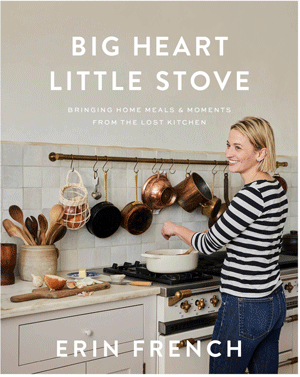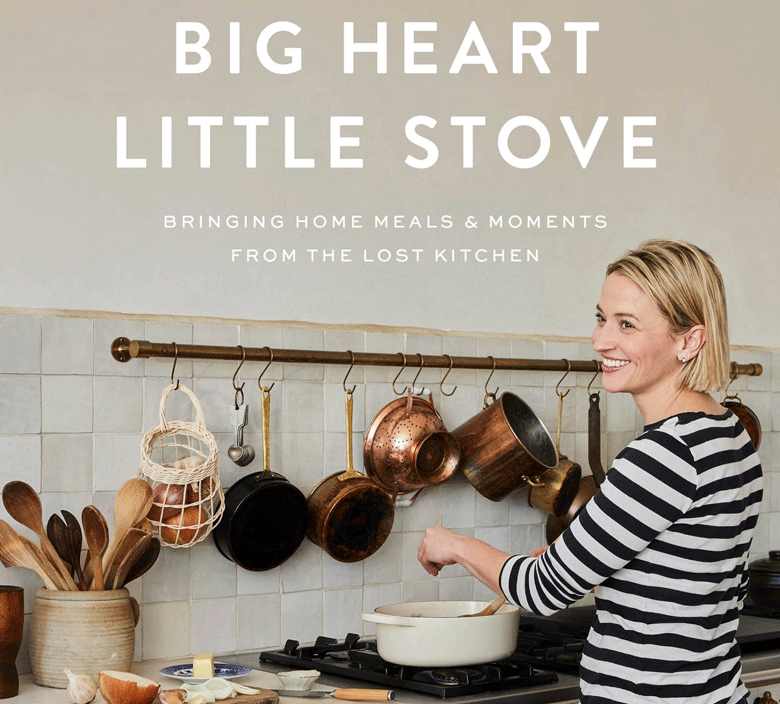Big Heart Little Stove: Bringing Home Meals & Moments From The Lost Kitchen
By Erin French (with Rachel Holtzman); Celadon Books, 2023.
I think it’s safe to say, at least in Maine and for her many fans, Erin French is considered something of a treasure. She has put a spotlight on rural life and the setting of her restaurant, The Lost Kitchen, in Freedom, the small town where she grew up.
These days, it doesn’t take a meal there to become familiar with her. In fact, scoring a meal takes luck—a postcard mailed in at just the right time, selected at random for a reservation. French is not only a cook, restaurateur, and booster of local seasonal food but also author and reality show star (The Lost Kitchen on Magnolia network).
But when I express my appreciation of her to friends, it’s led to some cynical reactions. They see her as curated and contrived, a Martha Stewart wanna-be. Thinking that reading and reviewing her three books has provided more insight, I point out they may not “get” Erin French.
There’s a lot of bravery and persistence in that history, one I suspect her fan base is aware of…
The Lost Kitchen scored points with me because while I read cookbooks cover to cover, I am especially delighted when a story is shared with the recipes. Her memoir, Finding Freedom, included painful revelations of how French’s life has not always been easy; it felt open and honest to me.
And now, after reading her new cookbook, Big Heart Little Stove, I’m curious. Is there some magic in the Lost Kitchen dining experience, besides what sounds like well-made and plentiful food and the thrill for guests of feeling “chosen”?
Let me just recap some of what Finding Freedom shared, because I think those life experiences are what have most shaped French’s goals as a cook. Bottom line: She is someone who knows the value of feeling cared for. I think of her as a survivor—and mind you, I don’t know if that is the way she would characterize herself, but here’s what I think she has survived.

She decided to drop out of college when she found out she was pregnant and then, realizing that the father—someone from high school days—was not going to be involved, returned home to her family in Freedom and had the baby as a single mom. Then she married and launched her cooking career, but it all unraveled, ending in a nasty divorce, followed by her fighting for custody to raise her son. A struggle with depression and anxiety led to being prescribed Xanax, which she became addicted to, but was able to recover from through a rehab program.
There’s a lot of bravery and persistence in that history, one I suspect her fan base is aware of, and provides all the more reason to celebrate and respect what she’s gone on to do.
French emphasizes that evoking emotions is at the very heart of her cooking. She wants diners to feel welcomed and cared for. That goes beyond the “set design” of vintage China and linens, armloads of wildflowers, candlelight, and music. French describes the ideal food experience as one where love infuses everything.
She writes, “When you care about the joy and well-being of your guests, that love can be tasted. People can feel it. And it’s the best ingredient there is.”
Each course is designed to bring a mood and a rhythm to the table: “When I think of the perfect meal, it’s one during which our guests are moving through these feelings, alternating between getting lost in their own emotions and connecting more deeply with the people around them.”
Overall, French believes simpler is better. But the book’s recipes suggest there’s also a Lost Kitchen twist thrown in, maybe a bit of an attention grabber. It could be an unexpected ingredient, or the way something is served. Fried fish in newspaper cones, shucked oysters nestled on frozen rocks. A mussel chowder with the surprise addition of lime juice and zest with cilantro garnish. Seared scallops covered as they cook with fresh cedar sprigs. Edible flowers, actually intended for eating.
But the wow factor isn’t just for the look or flavor. Imagine the hours-long meal winding down after the serving of a spectacular dessert like cream puffs with salted caramel sauce topped with sweet cream ice cream. The plates are cleared. But wait! Just-baked cookies and glasses of milk arrive at the table. As if being tucked in bed, we’re invited to regress a little at the end. What better way to say “sweet dreams”?
I haven’t sent off a postcard, but French doesn’t seem to think we need to find the Lost Kitchen to find inspiration. “Make something special for people you care about” is her advice. Love is delicious!
Tina Cohen is a therapist who spends part of the year on Vinalhaven.





